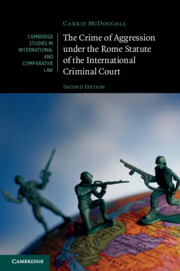4 results
3 - The Powers of the Security Council
-
- Book:
- The UN Security Council and International Law
- Published online:
- 02 June 2022
- Print publication:
- 09 June 2022, pp 59-69
-
- Chapter
- Export citation
C - Resorting to the Use of Force in Nuclear Operations
-
- Book:
- Nuclear Weapons Law
- Published online:
- 30 November 2021
- Print publication:
- 20 January 2022, pp 28-57
-
- Chapter
-
- You have access
- Open access
- HTML
- Export citation
3 - An Act of Aggression
-
- Book:
- The Crime of Aggression under the Rome Statute of the International Criminal Court
- Published online:
- 11 June 2021
- Print publication:
- 12 August 2021, pp 85-153
-
- Chapter
- Export citation

The Crime of Aggression under the Rome Statute of the International Criminal Court
-
- Published online:
- 11 June 2021
- Print publication:
- 12 August 2021

